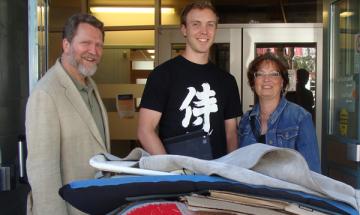Grad research aids coalition on homelessness
- Christine McLaren

When Health Information Science grad student Tyrone Austen went looking for a master's thesis topic, he wanted to do something that would have impact and make a difference close to home. "I wanted to work on a project that would provide immediate benefits to the community and improve efforts to address homelessness," says recent master's graduate Austen.
He sought the supervision of Denis Protti from the School of Health Information Science, a pioneer in the field of health informatics research, and Bernie Pauly from the School of Nursing and Centre for Addictions Research of BC. Pauly's work focuses on advancing long-term strategies to address homelessness. She is a member of the Greater Victoria Coalition to End Homelessness management committee and co-chairs the research, evaluation and data working group.
The coalition needed a method of reporting back to the community, and Austen set out to measure and evaluate the progress of homelessness programs in Victoria. The result was the 2010 Report on Housing and Supports, delivered at the coalition's annual general meeting in June.
"I had the opportunity to experience the community impact of my findings and how they can be used to help improve evaluation of the program," says Austen.
His report card framework provides the coalition with an annual means of evaluating and reporting the effectiveness of progress in addressing the complex issue of homelessness in the community.
"This master's thesis was a unique learning opportunity because the research was grounded in the needs of the community and facilitated by a community-university partnership," says Pauly.
Austen determined that better integration of data gathering among the more than 20 agencies addressing the homelessness issue would make both evaluation and service delivery more effective. Based on these findings, several of the agencies involved in the research have already begun planning to advance their information management capabilities. His findings were broken down into specific areas: emergency shelters, economic factors, housing, outreach and hospital use.
"The data showed that due to Victoria's unfriendly housing market and unbalanced living wage, homelessness is not a choice," says Austen.
The Greater Victoria Coalition to End Homelessness is a community-based partnership of service providers in the non-profit and public sectors, advocates, business representatives and elected municipal officials formed in February 2008 to lead the region's commitment to end homelessness.
More information about the report card findings: www.solvehomelessness.ca/index.html





